Bb12-3
The end of the
Babylonian
list of ecliptic stations was at Spica (*202), i.e.
60 days after Alphard (*142) and 54 days after Ras
Elaset Borealis (*148), the Northern Head of the Lion. Here the Lucky King (Sadalmelik)
culminated (at 21h):
 |
 |
 |
 |
 |
 |
 |
|
Bb1-15 |
Bb1-16 |
Bb1-17 |
→ 4 * 29½ |
Bb1-19 |
Bb1-20 |
Bb1-21 |
|
mai tae rere te manu
ki te mea maa i te
rima |
kua rere ïa ki te
veveke |
mai tae hokohuki - ia
koia ra |
kua rerega a
manu |
rere ki te hetu mai
tae hua ia |
kua haga ia
ki te mea o tona
hare pure |
|
Veve.
Pau.: miserable. Ta.: veve,
poor, needy, miserable. Churchill.
Veveke, to hurry up, hasten,
quicken. Websters.
Pure.
Cowrie (Cypraea caput
draconis); pure vaka, another
type of cowrie, which can float on the
sea like a diminutive boat (vaka).
Vanaga. 1. To pray, to supplicate,
invocation, prayer; hare pure,
church, chapel; tae pure,
irreverence; purega, prayer P
Pau., Mgv., Mq., Ta.: pure, to
pray. In Samoa, Tonga, Niuē,
Futuna, Uvea, pule
means to command. 2. A shell T. P
Pau.: hakapurepure, to dye, to
color. Mq.: pué, the porcelain
shell. Ta.: pure, a mark.
Purepure, spotted, dappled; ragi
purepure, dappled sky. Purepurea,
spotted. P Pau.: hakapurepure, to
dye, to color. Mgv.: purepure,
printed cloth; akapurepure, to
paint in different colors. Mq.:
puépué, covered with pale scars.
Ta.: purepure, spotted, dappled.
Churchill.
Pureva, rock, stone (small
enough to be thrown by hand). Vanaga.
Pureva,
to throw a stone. Ta.:
Pureva,
to be on the eve of going. Ha.:
puleva,
to float here and there. Churchill.
Pau.: Pure-hiva, a butterfly.
Mgv.: pure-rehue, id. Ta.:
pure-hua, a moth. Mq.: pure-hua,
id. Ma.: pure-hua, id. Churchill.
Hare. House,
family, home. Vanaga. House, cabin,
habitation, building, hut,
structure; hare iti, hut;
hare itiiti no, cabin;
hare kahu, tent; hare neinei,
latrine; hare no iti, cell;
hare nunui, palace; hare
pohurihuri, prison; hare pure,
chapel, church; ki te hare,
at home. Harepepe, kelp.
Harepiko, a. asylum, place of
refuge; b. ambush, snare.
Harepopo, shed. Harepopokai,
storehouse. Churchill.
|
|
VISIBLE CLOSE TO THE FULL MOON: |
|
CASTRA = ε Capricorni
(327.2),
BUNDA =
ξ Aquarii
(327.5)
SIRIUS (α Canis Majoris) |
Mahar sha hi-na
Shahū-26 (Western One in the Tail of the
Goat)
NASHIRA
(Fortunate One) =
γ
Capricorni
(328.0),
ν
Oct. (328.3),
AZELFAFAGE (Tail of the Hen) =
π¹
Cygni,
κ
Capricorni (328.7) |
Arkat sha hi-na
Shahū-27 (Eastern One in the Tail of the
Goat)
ENIF (The Nose) =
ε
Pegasi, ERAKIS =
μ
Cephei
(329.2),
46 CAPRICORNI, JIH (the Sun) =
κ
Pegasi
(329.3),
ι
Piscis Austrini (329.4),
λ
Capricorni (329.6),
ν
Cephei (329.7),
DENEB ALGIEDI =
δ
Capricorni
(329.8)
*288.0 = *329.4 - *41.4 |
θ
Piscis Austrini (330.1),
λ
Oct.
(330.7) |
KUH (Weeping)
=
μ
Capricorni (331.4),
γ
Gruis (331.5)
*290.0 = *331.4 - *41.4 |
No star listed (300 + 32) |
η Piscis Austrini (333.4)
*292.0 = *333.4 - *41.4 |
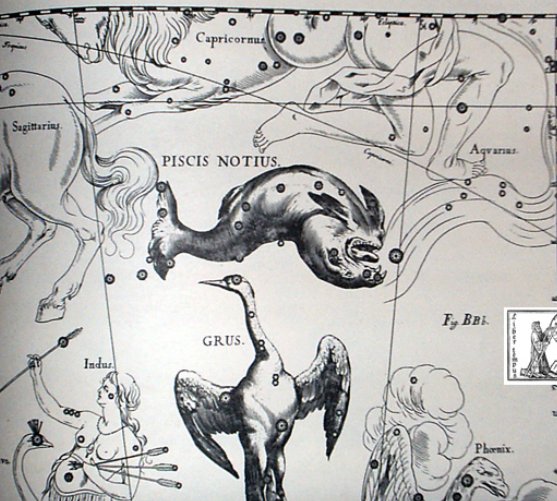
...
The four bereaved and searching
divinities, the two mothers and their
two sons, were joined by a fifth, the
moon-god Thoth (who appears sometimes in
the form of an ibis-headed scribe, at
other times in the form of a baboon),
and together they found all of Osiris
save his genital member, which had been
swallowed by a fish ... |
|
Febr 11 |
12
(437 - 29) |
13
(*329) |
14 |
15 |
16
(412) |
17
(14 * 29½) |
|
9 (7
* 7 * 7) |
DEC
10 (344) |
11 |
12 |
13
(LUCIA) |
14
(348) |
15 |
|
INVISIBLY
CLOSE TO THE SUN: |
|
Star-25 (Horse)
/
ANA-HEU-HEU-PO-5
(Pillar where debates were held)
ALPHARD (The Horse) =
α
Hydrae
(142.3),
ω
Leonis (142.6),
τ¹
Hydrae (142.7) |
Al Tarf-7 (The
End)
ψ
Velorum (143.3),
ALTERF =
λ
Leonis,
τ²
Hydrae (143.4),
ξ
Leonis (143.5)
*102.0 = *143.4 - *41.4 |
A Hydrae
(144.1)
VEGA (α Lyrae) |
Creation of our present world
UKDAH (Knot) =
ι
Hydrae (145.4),
κ
Hydrae (145.5),
SUBRA =
ο
Leonis
(145.8)
ALPHEKKA MERIDIANA
*104.0 = *145.4 - *41.4 |
5 Imix 9 Kumk'u
Rishu A.-13 (Head of the Lion)
ψ Leonis (146.4),
RAS ELASET AUSTRALIS = ε Leonis
(146.6)
*105.0 = *146.4 - *41.4 |
VATHORZ PRIOR = υ Carinae
(147.9) |
υ¹
Hydrae (148.4),
RAS ELASET BOREALIS (Northern Head of
the Lion) =
μ
Leonis
(148.7)
*107.0 = *148.4 - *41.4 |
|
UKDAH (THE KNOT) |
|
Aug 10 |
11 (183 + 40) |
12 (224) |
13 (408 - 183) |
14 |
15
(227
→
π) |
16 |
|
JUNE
7 |
8 |
9 (224 - 64) |
10 (161) |
11 |
12 |
13 |
|
... Midsummer is the flowering season of
the oak, which is the tree of endurance
and triumph, and like the ash is said to
'court the lightning flash'. Its roots
are believed to extend as deep
underground as its branches rise in the
air - Virgil mentions this - which makes
it emblematic of a god whose law runs
both in Heaven and in the Underworld ...
The month, which takes its name from
Juppiter the oak-god, begins on June
10th and ends of July 7th. Midway comes
St. John's Day, June 24th, the day on
which the oak-king was sacrificially
burned alive. The Celtic year was
divided into two halves with the second
half beginning in July, apparently after
a seven-day wake, or funeral feast, in
the oak-king's honour ...
 |
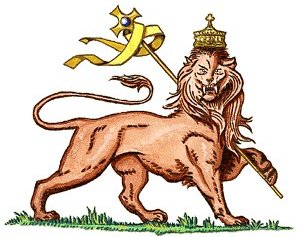
 |
 |
 |
 |
 |
 |
 |
|
Bb2-41 (72) |
Bb2-42 |
Bb2-43 |
Bb2-44 |
Bb2-45 |
Bb2-46 |
Bb2-47 (78) |
|
kua rere te tagata |
ki te huaga - o te
kahui |
e tagata hua era e |
e vaha ïa |
ma te Rei |
ko nuku |
ma te ika - ko te ika
kua here ai maro |
|
Kahui. Bunch;
kahui maîka, bunch of bananas.
Vanaga. Bunch, cluster. T Mgv.: kahui,
a bunch of grapes or pandanus. Mq.:
kahui, a bunch, cluster, troop,
assemblage. Ta.: ahui, heap,
collection. (Cf. Sa.: fui, a
cluster of nuts; fuifui, a
cluster of fruit, a flock of birds.)
Churchill. |
|
VISIBLE CLOSE TO THE FULL MOON: |
|
ADHIL (Garment's Train) = ξ Andromedae
(19.3),
θ
Ceti (19.7) |
KSORA (Knee) =
δ
Cassiopeiae
(20.1),
ω
Andromedae (20.6),
γ
Phoenicis (20.8) |
δ Phoenicis (21.5) |
υ Andromedae (22.9) |
ACHERNAR (End of the River) =
α
Eridani
(23.3),
χ
Andromedae (23.6),
τ
Andromedae (23.9) |
ALSEIPH (Scimitar) =
φ
Persei
(24.5),
τ
Ceti (24.7) |
No star listed (25) |
 |
|
April
9 (99) |
10 |
11 |
12 |
13 |
14 |
15 |
|
FEBR 4 |
5 (36) |
6 |
7 |
8
(39) |
9 |
10 |
|
INVISIBLY CLOSE TO THE SUN: |
|
Al Simāk-12
(Lofty) /
Chitra-14 (Bright
One) /
Horn-1 (Crocodile)
/
Sa-Sha-Shirū-19
(Virgin's
Girdle)
/
ANA-ROTO-3 (Middle pillar)
MIZAR =
ζ
Ursae Majoris (202.4),
SPICA =
α
Virginis,
ALCOR = 80 Ursae Majoris
(202.7)
SADALMELIK (α Aquarii)
*161.0 = *202.4 - *41.4 |
71 VIRGINIS
(203.6) |
No star listed (204) |
HEZE = ζ Virginis
(205.0),
SOUTHERN PINWHEEL GALAXY = M83 Hydrae
(205.7) |
ε Centauri (206.3),
κ Oct. (206.4)
*165.0 = *206.4 - *41.4 |
No star listed (207) |
τ
Bootis (208.2),
BENETNASH (Leader of the Daughters of
the Bier) =
η
Ursae Majoris
(208.5),
ν
Centauri (208.7),
μ
Centauri,
υ
Bootis (208.8) |
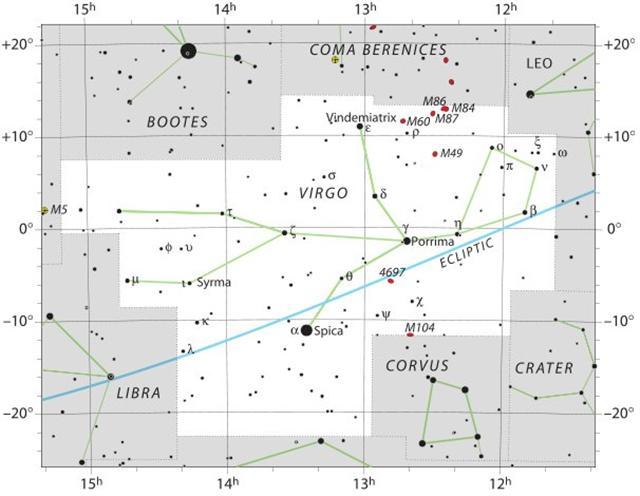 |
|
Oct 9 |
10 |
11 (284) |
12 |
13 |
14 |
15 (288) |
|
AUG 6 |
7 |
8
(220) |
9 |
10
(39 + 183) |
11 |
12
(*144) |
Next great heliacal star beyond Spica (*202) was Arcturus:
(*215):
...The Chinese called it [Boötes] Ta Kiō, the Great Horn,
four small stars near by being Kang Che, the Drought
Lake; Edkins further writing of it:
Arcturus is the palace of the emperor. The two groups of
three small stars on its right (ν, τ, υ) and left (ζ, ο, π) are
called She ti, the Leaders, because they assign a fixed
direction to the tail of the Bear, which, as it revolves, points
out the twelve hours of the horizon ...
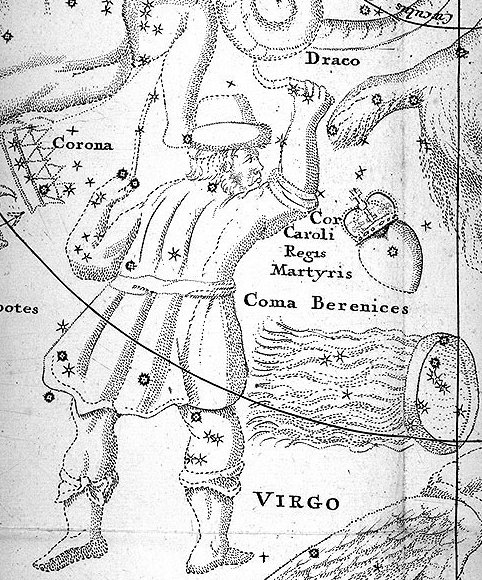
Virgo is pointing upwards (presumably towards the Tail of Ursa
Major), and 13 days after Spica came Arcturus:
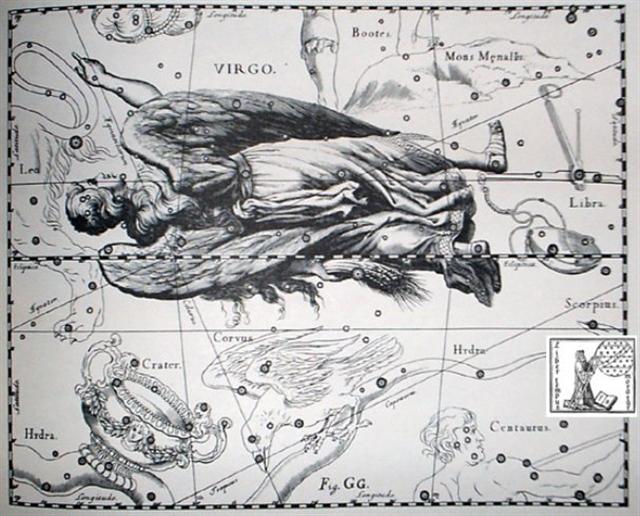
72 (Bb2-41) + 13 = 85 (Bb3-7). Possibly 85
→ 84 (→ Julian equinox) + 1 in
harmony with how the Mouth of the Fish had astonishlingly moved
one day ahead in the Sun calendar, from Fomalhaut (*347)
to Fum al Samakah (*348), from south of the equator
(29° 53′ S) to north of the equator (03° 49′ N). → 29 + 3 = 32 →
Dramasa (*320).
348 + 16 = 364 (4 * 91)
320 + 16 = 336 (4 * 84)
We should notice that the Arab word
samakah (Fish) appears to correspond to the Phoenichian
samekh (tent peg, supporting prop):
 |
 |
 |
|
Ca13-4 |
Ca13-5 (348) |
Ca13-6 |
|
tagata ma te kihikihi |
koia ra kua oho |
|
March 2 |
3 (428 = 80 +
348) |
4 (63) |
|
'Febr 4 (400 = 427 - 27) |
5 (36) |
6 |
|
ι Cephei (346.0), λ Aquarii, γ Piscis Austrini, σ
Pegasi (346.5) |
SCHEAT AQUARII = δ
Aquarii
(347.0),
ρ
Pegasi (347.2),
δ
Piscis Austrini (347.4),
FOMALHAUT (Mouth of the Fish) =
α
Piscis Austrini,
τ
Gruis (347.8)
*306.0 = *347.4 - *41.4 |
FUM AL SAMAKAH (Mouth of the Fish) =
β
Piscium
(348.3),
ζ
Gruis (348.5),
ο
Andromedae (348.9) |
|
No star listed (164)
ALTAIR (α
Aquilae) |
Wings-27
(Snake)
η
Octans (165.4), ALKES (Shallow Basin) =
α
Crateris
(165.6)
*124.0 = *165.4 - *41.4 |
ANA-TIPU-4 (Upper-side-pillar
- where the guards stood)
MERAK (Loin, not Lion) =
β
Ursae Majoris
(166.2),
DUBHE (Bear) =
α
Ursae Majoris
(166.7) |
|
Sept 1 |
2 (245) |
3 (63 + 183) |
And *19 (Adhil) + *13 = *32 (Bb3-7)
→ *320 (Dramasa):
|
4 |
 |
 |
 |
 |
|
Bb3-5 |
Bb3-6 |
Bb3-7 (85) |
Bb3-8 |
|
ki te henua |
koia - kua hoki to maro |
e manu rere ra |
ki te inoino - ka rere te
manu |
|
VISIBLE CLOSE TO THE FULL MOON: |
|
Arku-sha-rishu-ku-2 (Back
of the Head of Ku)
2h (*30.4 = *354.0 + *41.4)
κ
Arietis (30.3),
HAMAL (Sheep) =
α
Arietis
(30.5)
ALKES (α
Crateris) |
DELTOTUM = β
Trianguli
(31.2), ι Trianguli (31.7), η Arietis (31.9) |
ξ¹ Ceti
(32.1) |
γ,
δ
Trianguli (33.0),
χ
Persei (33.2),
10 Trianguli
(33.5),
θ
Arietis (33.3),
MIRA
(Astonishing) =
ο
Ceti
(33.7) |
|
djed |
 |
Phoenician
sāmekh |
 |
Greek
xi |
Ξ (ξ) |
|
... In rongorongo times
the last Greek lettered star
in Orion (ξ)
rose with the Sun in June 21. The letter
seems to have originated from the
Phoenician letter samekh (tent
peg, supporting prop), which in turn may
have been derived from the ancient
Egytian djed column ...
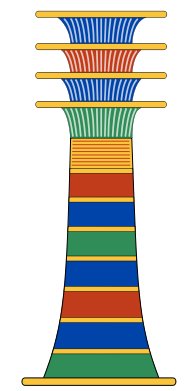 |
|
|
April 20 (110
= 22 * 5) |
(325 - 214 =
365 - 254) |
22 →
Dramasa (*32 * 10) |
23 (*31) |
|
FEBR 15 (46) |
16 |
17 |
18 |
|
... About
Carmenta we know from the historian Dionysus
Periergetis that she gave orcales to Hercules
and lived to the age of 110 years. 110 was a
canonical number, the ideal age which every
Egyptian wished to reach and the age at which,
for example, the patriarch Joseph died. The 110
years were made up of twenty-two Etruscan
lustra of five years each; and 110 years
composed the 'cycle' taken over from the
Etruscans by the Romans. At the end of
each cycle they corrected
irregularities in the solar calendar by
intercalation and held Secular Games. The secret
sense of 22 - sacred numbers were never chosen
haphazardly - is that it is the measure of the
circumference of the circle when the diameter is
7. This proportion, now known as pi, is
no longer a religious secret; and is used today
only as a rule-of-thumb formula, the real
mathematical value of pi being a decimal
figure which nobody has yet been able work out
because it goes on without ever ending, as 22 /
7 does, in a neat recurring sequence
[3.142857142857 ...]. Seven lustra add up to
thirty-five years, and thirty-five at Rome was
the age at which a man was held to reach his
prime and might be elected Consul. (The same age
was fixed upon by a Classically-minded
Convention as the earliest at which an American
might be elected President of the United
States.) ... |
|
INVISIBLY
CLOSE TO THE SUN: |
|
Oct 20 |
21 (*214) |
22 (295 = 10
* 29½) |
23 |
|
AUG 17 (229) |
18 |
19 |
20 (232) |
|
14h (213.1)
π Hydrae, χ
Centauri (213.0),
MENKENT (Shoulder of the Centaur) =
θ
Centauri
(213.1) |
Neck-2 (Dragon)
ASELLUS TERTIUS (3rd Ass Colt) =
κ
Bootis,
κ
Virginis,
14 Bootis
(214.8) |
Al Ghafr-13 (The Cover)
/
Svāti-15 (Very Good)
/
TAHUA-TAATA-METUA-TE-TUPU-MAVAE-6
(a pillar to stand by)
15 Bootis
(215.2),
ARCTURUS =
α
Bootis (215.4),
ASELLUS SECUNDUS (2nd Ass Colt) =
ι
Bootis
(215.5),
SYRMA (Train of the Virgin's Robe) =
ι
Virginis,
λ
Bootis (215.6),
η
Apodis (215.8)
*174.0 = *215.4 - *41.4 |
ι Lupi,
18
Bootis
(216.3),
KHAMBALIA (Crooked-Clawed) = λ
Virginis (216.4),
υ Virginis (216.5), ψ Centauri (216.6), ε Apodis
(216.8)
*175.0 = *216.4 - *41.4 |
|
Egyptian hand |
 |
Phoenician kaph |
 |
Greek
kappa |
Κ (κ) |
|
Kaph is
thought to have been derived from a
pictogram of a hand (in both modern
Arabic and modern Hebrew, kaph
means palm/grip) ...
... The manik, with the
tzab, or serpent's rattles as
prefix, runs across Madrid tz. 22 ,
the figures in the pictures all
holding the rattle; it runs across
the hunting scenes of Madrid tz. 61,
62, and finally appears in all four
clauses of tz. 175, the so-called
'baptism' tzolkin. It seems
impossible, with all this, to avoid
assigning the value of grasping or
receiving. But in the final
confirmation, we have the direct
evidence of the signs for East and
West. For the East we have the glyph
Ahau-Kin, the Lord Sun, the
Lord of Day; for the West we have
Manik-Kin, exactly corresponding
to the term Chikin, the
biting or eating of the Sun, seizing
it in the mouth.

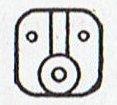

The pictures (from
Gates) show east, north, west, and
south; respectively (the lower two
glyphs) 'Lord' (Ahau) and
'grasp' (Manik). Manik
was the 7th day sign of the 20 and
Ahau the last ... |
|
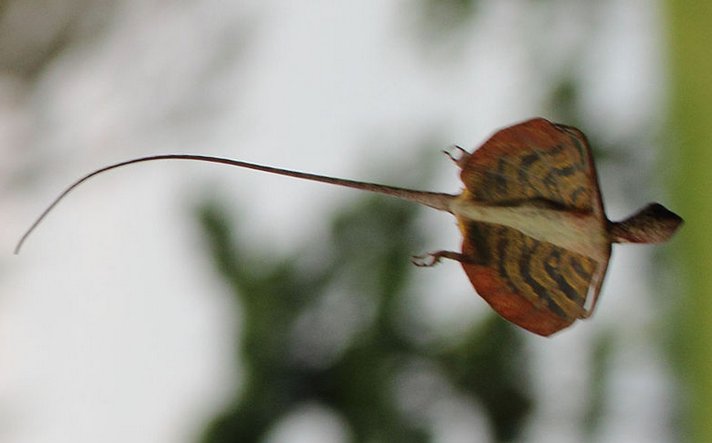
However,
we should not leap over AUGUST 13
(225), when according to the Mayas our current World
had been
created:
 |
 |
 |
 |
|
Bb3-1
(500 → 365 + 135) |
Bb3-2
(80 → 0h) |
Bb3-3
(81 = 502 -
421) |
Bb3-4 |
|
ko te
nuku |
ku tara huki |
kua hama te
nuku |
mai tae te tagata -
hua ra |
|
Maehamaeha,
bright. Pau.: hamama, to open.
Mq.: haámama, to open the mouth.
Churchill. |
|
STARS
VISIBLE CLOSE TO THE RIGHT ASCENSION
LINE AT THE FULL MOON: |
|
ANA-NIA-10
(Pillar-to-fish by)
χ Ceti (26.1),
POLARIS = α Ursae Minoris,
BATEN KAITOS (Belly of the Fish) = ζ
Ceti
(26.6),
METALLAH = α Trianguli
(26.9) |
Al Sharatain-1
/
Ashvini-1
/
Bond-16 (Dog)
/
Mahrū-sha-rishu-ku-1 (Front of the Head
of Ku)
SEGIN =
ε
Cassiopeia, MESARTHIM =
γ
Arietis,
ψ
Phoenicis (27.2),
SHERATAN (Pair of Signs) =
β
Arietis,
φ
Phoenicis (27.4)
*351.0 = *27.4 - *41.4 |
ι Arietis (28.0), λ Arietis (28.2), υ
Ceti (28.8) |
ALRISHA (The Knot) = α Piscium,
χ Phoenicis (29.2),
ε Trianguli (29.4),
ALAMAK
(Caracal) = γ Andromedae
(29.7)
*353.0 = *29.4 - *41.4 |
|
April
16 |
17
(107) |
18 |
19 |
|
FEBR 11 (407) |
12
(43 = 408 - 365) |
13 |
14
(45) |
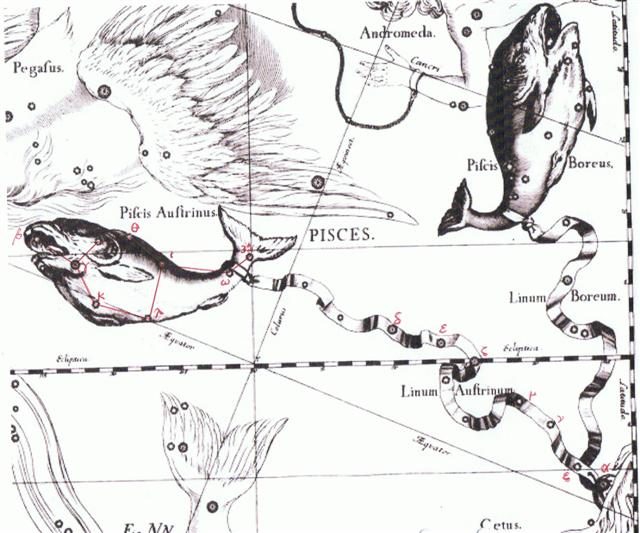 |
|
...Then the big Fish
did swallow him, and he had done acts
worthy of blame. Had it not been that he
(repented and) glorified Allah, He would
certainly have remained inside the Fish
till the Day of Resurrection. - Qur'an,
chapter 37 (As-Saaffat), verse 139–144.
But We cast him forth on the naked shore
in a state of sickness, And We caused to
grow, over him, a spreading plant of the
gourd kind. And We sent him (on a
mission) to a hundred thousand (men) or
more. And they believed; so We permitted
them to enjoy (their life) for a while.
- Qur'an, chapter 37 (As-Saaffat), verse
145–148 ...

... I
know I was born at the edge of the sea,
and you cut off a tuft of your hair and
wrapped me in it and threw me in the
waves. After that the seaweed took care
of me and I drifted about in the sea,
wrapped in long tangles of kelp, until a
breeze blew me on shore again, and some
jelly-fish rolled themself around me to
protect me on the sandy beach. Clouds of
flies settled on me and I might have
been eaten up by the maggots; flocks of
seabirds came, and I might have been
pecked to pieces. But then my
great-ancestor Tama nui ki te rangi
arrived. He saw the clouds of flies
and all the birds, and he came and
pulled away the jelly-fish, and there
was I, a human being! Well, he picked me
up and washed me and took me home, and
hung me in the rafters in the warmth of
the fire, and he saved my life. And I
grew, and eventually I heard about the
dancing you have here in this house, and
that is what brought me here tonight ... |
|
HALF A YEAR AWAY AT THE NAKSHATRA SUN: |
|
No star listed (209) |
MUPHRID (Solitary Star) = η Bootis
(210.1), ζ Centauri (210.3) |
φ Centauri (211.0), υ¹ Centauri (211.1),
υ² Centauri (211.8), τ Virginis (211.9) |
AGENA (At the Knee) =
β
Centauri
(212.1),
θ
Apodis (212.5),
THUBAN (Dragon) =
α
Draconis
(212.8) |
|
...
Thuban had been the star at the North
Pole when the great Egyptian pyramids
where built ... The star could be seen,
both by day and night, from the bottom
of the central passage of the Great
Pyramid of Cheops (Knum Khufu) at
Ghizeh, in 30° of north latitude, as
also from the similar points in five
other like structures; and the same fact
is asserted by Sir John Herschel as to
the two pyramids at Abousseir ...
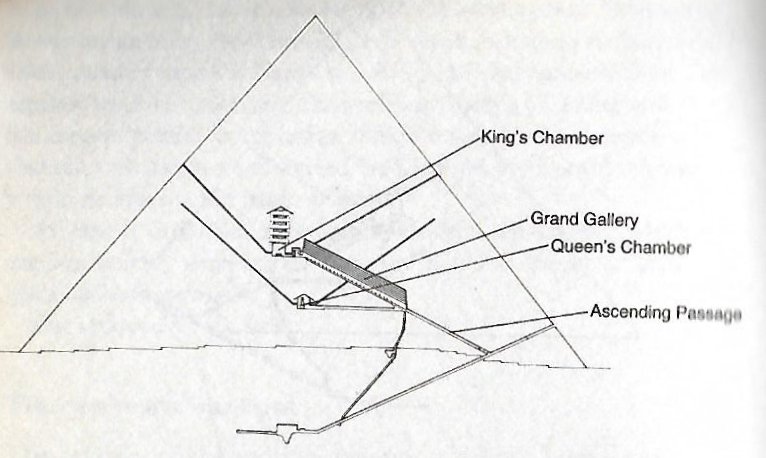
...
For some reason, too, it had taken their
fancy to place the Great Pyramid almost
exactly on the 30th parallel at latitude
29º 58' 51". This, a former astronomer
royal of Scotland once observed, was 'a
sensible defalcation from 30º', but not
necessarily in error: For if the
original designer had wished that men
should see with their body, rather than
their mental eyes, the pole of the sky
from the foot of the Great Pyramid, at
an altitude before them of 30º, he would
have had to take account of the
refraction of the atmosphere, and that
would have necessitated the building
standing not at 30º but at 29º 58' 22'
... |
|
CORRESPONDING DATES ACCORDING TO THE
GREGORIAN CALENDAR: |
|
Oct
16 |
17
(290 = 107 + 183) |
18 |
19 |
|
AUG
13
(225
→ 15 * 15) |
14
(290 - 64) |
15
(227 → π) |
16 |
Bootes appears to have inherited the Virgo idea
of an arm
pointing upwards:
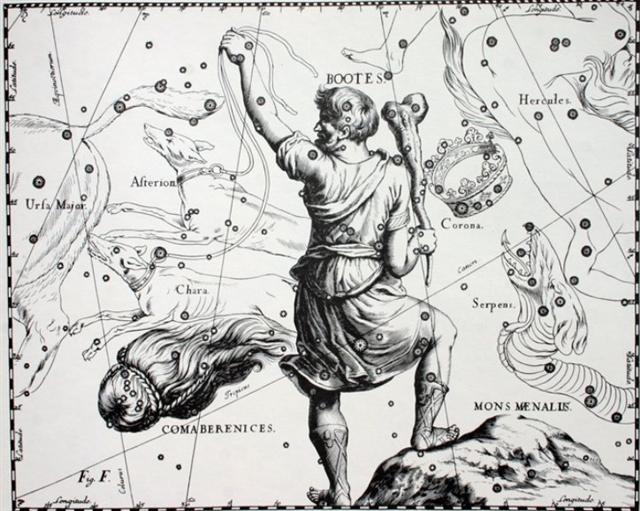
... It [Decree of
Canopus] inaugurates the most
accurate solar calendar known to the ancient
world, with 365¼ days per year. It declares the
deceased princess Berenike a goddess and
creates a cult for her, with women, men,
ceremonies, and special 'bread-cakes'.
|
Egyptian bread, (-t, female
determinant) |
 |
Phoenician qoph |
 |
Greek
phi |
Φ(φ) |
|
... is the 21st
letter of the Greek alphabet ... Its
origin is uncertain but it may be
that phi originated as the letter
qoppa ... In traditional Greek
numerals, phi has a value of 500 or
500000 ...
Isaac
Taylor, History of the Alphabet:
Semitic Alphabets, Part 1, 2003:
'The old explanation, which has
again been revived by Halévy, is
that it denotes an 'ape,' the
character Q being taken to
represent an ape with its tail
hanging down. It may also be
referred to a Talmudic root which
would signify an 'aperture' of some
kind, as the 'eye of a needle,' ...
Lenormant adopts the more usual
explanation that the word means a
'knot' ...

... The king, wearing now a short,
stiff archaic mantle, walks in a
grave and stately manner to the
sanctuary of the wolf-god Upwaut,
the 'Opener of the Way', where he
anoints the sacred standard and,
preceded by this, marches to the
palace chapel, into which he
disappears. A period of time elapses
during which the pharaoh is no
longer manifest.
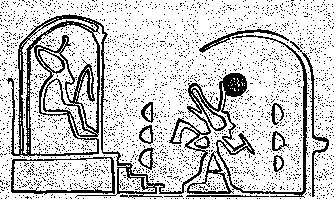
When he reappears he is clothed as
in the Narmer palette, wearing the
kilt with Hathor belt and
bull's tail attatched. In his right
hand he holds the flail scepter and
in his left, instead of the usual
crook of the Good Shepherd, an
object resembling a small scroll,
called the Will, the House Document,
or Secret of the Two Partners, which
he exhibits in triumph, proclaiming
to all in attendance that it was
given him by his dead father
Osiris, in the presence of the
earth-god Geb. 'I have run',
he cries, 'holding the Secret of the
Two Partners, the Will that my
father has given me before Geb.
I have passed through the land and
touched the four sides of it. I
traverse it as I desire.' ...
.jpg) |
... Ebony label EA
32650 from Den's tomb. The upper right
register depicts king Den twice: at the left
he is sitting in his Hebsed pavilion, at the
right he is running a symbolic race around
D-shaped markings. This ceremony is
connected to the so-called 'race of the Apis
bull'. The middle right section reports
about the raid of the city 'beautiful door'
and about a daughter of Den suffering from
an unknown disease. The lower right section
reports about the visitation of the 'souls
of Peh' at the royal domain 'Wenet'. The
left part of the label describes the content
of the vessel that once belonged to the
label and mentions the high official
Hemaka, who was obviously responsible for
the delivery of the labeled jar ...
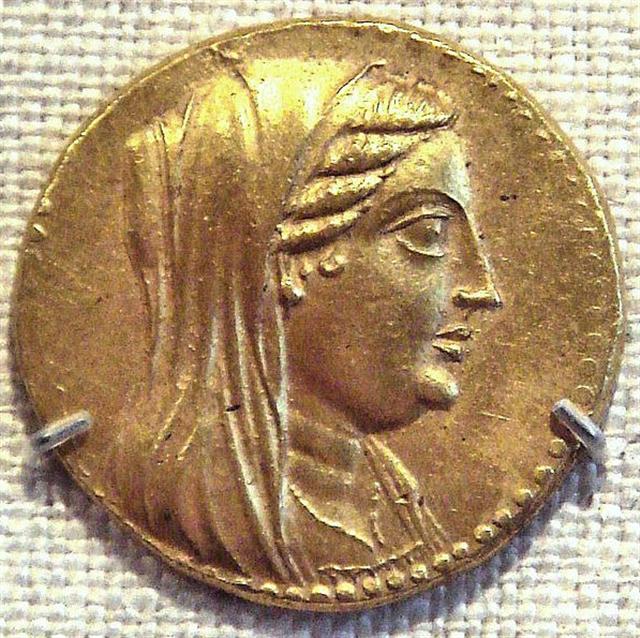
Lastly it orders the decree
to be incised in stone or bronze in both
hieroglyphs and Greek, and to be publicly
displayed in the temples. The traditional
Egyptian calendar had 365 days: twelve months of
thirty days each and an additional five
epagomenal days. According to the reform, the
5-day 'Opening of the Year' ceremonies
would include an additional 6th day every fourth
year. The reason given was that the rise of
Sothis advances to another day in every 4 years,
so that attaching the beginning of the year to
the heliacal rising of the star Sirius would
keep the calendar synchronized with the seasons.
This Ptolemaic calendar reform failed, but was
finally officially implemented in Egypt by
Augustus in 26/25 BCE, now called the
Alexandrian calendar, with a sixth epagomenal
day occurring for the first time on 29 August 22
BCE. Julius Caesar had earlier implemented a
365¼ day year in Rome in 45 BCE as part of the
Julian calendar ...

|































.jpg)

